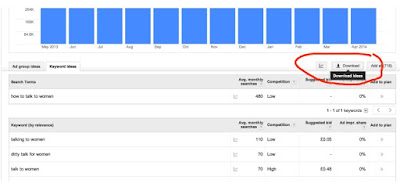YouTube Video Creation
Youtube Video Creation Tools Creating videos does not require fancy software such as Camtasia. Consider these free tools.
PowerPoint Many marketers have PowerPoint already. You can make very good quality videos through PowerPoint. It has a simple interface.
Open Office Impress You can use Open Office Impress to Create Videos. Download here
The first step in creating your video is to decide which keyword you are going to target, for this example I am going to target "how to potty train a puppy" now having a target keyword won't help too much in the beginning when we are buying traffic, but it will help us rank later after we stop buying traffic.
Once you decide on your keyword the next step is to write the content for the video so that you have at least a general outline of what to say. The key to getting people to click through from your videos to your report is to give great content and then ask them to click through.
The Video Outline
Introduction - Give your viewer an introduction to yourself and/or the content which will be covered.
Viewer Benefits - Tell the viewer what benefits they will get from watching. What will you be teaching them in broad strokes.
Give them what You Told Them - Deliver the contents
Recap - Remind them what you told them. Make sure you have delivered true value.
Call to Action - Move the viewer to Action. Move them to click through. - If you want to `get our report' `if you want to learn more'
Silence - Give on screen visualizations of what to do next
Redirect their attention away from other competing videos
This also bears repeating over and over: Focus on benefitting the viewer! Make sure your presentations are moving the viewer towards your magnet.
YouTube Video Optimization
Prepping Your MP4 for Upload
It seems that the more you help YouTube the more they reward you. So by putting some basic information into the properties of your .mp4 you do get a certain boost.
File Properties Prior to Uploading Edit File and Upload Video
1) Rename you video file to the long tail keyword - ex howtobuildalistquickly.mp4
2) Right click file and go to details - you want to put the same name in for title
3) For the subtitle you want to input some LSI keywords (ex Tired of slowly building a list? Watch this video to learn how to learn easy to implement tips)
4) In tags you'll want to put in your keywords, separated by a semi-colon.
5) In comments put something related + some lsi keywords - don't keyword stuff else risk penalized for keyword stuffing
Another Word on Niche Competition
Let's revisit some specific points regarding Video Niche Competition. You must keep your competition in perspective if you're going to rank effectively. Depending on your niche, the odds of finding a video that is PROPERLY optimized are slim. Let's concentrate on the basics focusing on these will get us placing in the upper 5% out of the gate.
Video Title: Is the real KEYWORD in the video title?
Video Long-Tail Keywords: We need to focus on Long-Tail Keywords as these
1) Show buyer intent
2) Drive on on-page video SEO
Video Description: We need to follow best practices here. We cannot over-optimize, but we also want to `prime' the description all we can.
Video Tags: Ensure we have all the keywords possible. We ARE NOT going to be penalized here. Hint: Opportunity.
Video Views: The Google algorithm (on SERP) and YouTube algorithms (On-page) use views as a primary means when returning results.
Video Likes: How many likes or "thumbs up" does this video have? How many social signals have been sent.
Writing a Good Title
Use the video keywords as a title. Remember to name some videos with buyer intent words: Review, Demo, How To, Product X vs Product Y
- The main keyword for which you are trying to rank HAS to be in your YouTube video title (for instance we are wanting your beagle puppy to stop biting)
- I recommend that you place the keyword is near the beginning of your video
- You want to include as many LSI words as possible
- You also want people to click on the title so short form CTA (Call to Action) is important. Make it benefit oriented.
Description Optimization
The very first thing in your description should be a link to your squeeze page.
For the rest of your description I recommend either using your exact transcript, or writing an article to fill the space. You should try and use every ounce of space they give you, YouTube has said that the longer your description the better chance you have to rank.
Also at the very end of your description you want to insert a link to the video page. It will end up linking to itself, but if someone scrapes your description you will receive a link. Just doing this usually gets you 20 or so backlinks.
Warning: DO NOT keyword stuff your video description, use your keyword when it is appropriate, don't go out of your way to use it, that is the fastest way to get the boot!
Tag Optimization
Use the keywords and long tails you discovered during your research stage. The more long tail tags you put in here the better. Feel free to put as many in here as you can think as you won't be penalized.
Video Optimization
To rank effectively you will need to optimize your videos. This optimization has to do mainly with keyword titles, video description, video tags
Repeating keywords
Be careful how often you repeat keywords. 1 in 100-150 words in the video description is ideal. You risk being penalized if you exceed this.
Video Description YouTube favors videos which have 300-600 words. This only helps flag the video as true content.
Category: Use the same category as those videos which are currently ranking high
Audio Encoding and YouTube Signals: A large factor in how YouTube determines the authority, and subsequently the rank of you video is the actual audio in the video. YouTube actually:
1) Will strip the audio and convert into text and transcribe it themselves
2) They'll analyze the keywords you talk about in your video
** If you want the highest rankings possible - then you need spoken words - and your script best have those keywords you are trying to rank in there
Transcription and Closed Captioning
Help YouTube discover your keywords and LSIs You need to:
1) Upload a transcription of what is said on the video. YouTube place more authority for the video if the audio and then the transcription is matching.
2) Turn on closed captioning (it's okay to let YouTube perform this)
Now Follow the Step: Find your file - Click on edit - go to caption (if you try and keyword stuff with the caption - they will know) - It's a good idea to separate your sentences inside the transcription box - What it does know after you select sync - is compare your audio with your transcript to make sure it is correct.
Video Settings
Some setting you will want to have for you videos are below: Make sure it's public.
Here are my recommended advanced settings:
YouTube Video Channel Optimization Channel name
- Your channel name will appear across the site in search, suggested channel and channel browse placements.
- Your channel name is distinct from your channel URL; the name can be edited from the channel page.
- Pick a channel name that is short, memorable and gives your audience an idea of what your channel is about.
Channel description
- The first few sentences of your channel description appear most frequently across the site so highlight your most important content upfront.
- Accurately describe your channel.
- Use relevant keywords in the description.
- Include your upload schedule, especially if you host multiple content types or series.
- Example of a great description: VICE: "VICE specializes in exploring uncomfortable truths and going to places we don't belong. Now, thanks to YouTube, we have compressed two decades of our unique immersive approach to these subjects into delicious bite-size morsels. Herein you will find people talking frankly about their hatred and love for various things, general heresy, the only travel and news documentaries you'll want to watch, tons of exclusive new stuff, and probably a lot of cats. You're welcome."
Channel icon
- Upload a square, high-resolution (800px x 800px) image that is recognizable at smaller resolutions. This image will be your channel's icon throughout the site.
- Use text sparingly; it can be illegible at smaller resolutions.
Channel art
- Create customized, visually-compelling channel art. Use the channel art tool to choose how the image appears on desktop, mobile, and TV. Remember, busy images don't scale well so try to keep the image simple, yet representative of your brand.
- Channel art should reflect your channel's personality. Make the audience feel like they're connecting with a person or character and not just a brand.
- Add website and social media links to the About tab. These links can also be exposed on your home tab and help tie your YouTube presence to the rest of your online brand.
- Check how your channel looks in search, related channels and the channel browse page. Do your channel icon, channel name and channel art do a good job of describing your channel to potential fans? Checkout Here
Homework
Look through YouTube's online information. It is all very well written and easy to understand. You'll probably want to add this to your bookmarks. You can find this information at Here













